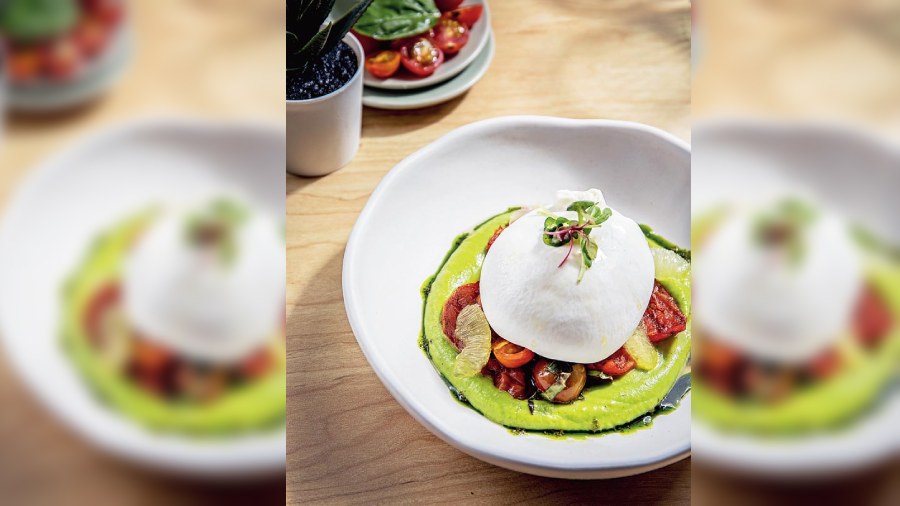For chefs, a plump tomato, box of fresh, responsibly grown microgreens or crate of buttery Coorgi avocados are the equivalent of good quality art supplies for painters. After all, the plate is our canvas. And most of us are elated that the sustainability movement is garnering so much support. Ten years ago, when I was fresh out of culinary school and had internships at fine-dines helmed by international chefs or national chefs with international experience, I genuinely believed in the mantra of “imported is best”. Cut to 2022, and the scenario is completely different. Today, working with local suppliers and businesses is not only much more possible, but also culturally “cool”. And yet, that’s not the reason why most of us from the industry choose capers grown in a village in Tamil Nadu over the ones from Sicily.
Between both my restaurants in Kolkata and Mumbai, I work with a number of sustainable and homegrown brands such as Taru Organics, which offers a host of things, from premium flours to fresh produce, with Sleepy Owl and Blue Tokai for coffee. Then there’s Mavi’s Pantry, where we source our kimchi from and which specialises in other fermented products like kombucha, beet kvass and kefir; Ishka Farms, which I swear by for the capers, caperberries and recently, they also ventured into ready-to-eat condiments; and Valley Culture that’s doing a splendid job of putting produce from Uttarakhand on India’s culinary map.

However, working with them also means shrunk profit margins for my businesses. So I am consciously choosing to pay more. This is a difficult choice, because there are brands out there that are cheaper. But they don’t give me the same yield, in terms of taste, quality or adding value to the dish. Apart from that, there’s also this inane understanding that we need to support our farmers. They’re part of the chain, and without them there is no food industry.
When I started out, I understood very little about this but the more I interacted with vendors and visited marketplaces, the more I learnt about their reality, with most of them having serious debt. So when I started setting up my first restaurant, Bodega, I decided to work directly with growers instead of suppliers. And that was a massive headache. For example, the guy we sourced our greens from had a patch of land big enough to grow just that. This meant that we had to coordinate with multiple people, instead of just one. Plus, we were paying a premium. The sustainability movement has definitely changed for the better with chefs and consumers alike becoming more aware and a shift in the demand-and-supply chain, which is all apparent in the sudden and widespread emergence of B2B, farm-to-table brands that are as keen to supply to businesses as they’re to consumers. I mean, there are so many today! Just look at the rise in the number of homegrown coffee, chocolate and cheese brands for starters.
Having said that, the movement does have some gaps. To begin with, both consumers and businesses need to understand and address the difference between organic and fair-trade. While the former takes care of how the produce is grown, like the manure that’s used, the latter has more to do with how it gets to you and how those growing it are treated. For sustainability to be true and holistic, both need to be considered. But a lot of brands self-proclaim themselves as ‘sustainable’ without really taking care of these factors. Then, there’s the issue with price points, which is a veritable deterrent towards everyone shifting to sustainable options. I’ll give you an example of packaging. A bagasse salad box or coffee cup is a lot more expensive than the regular kind, and the simple truth is that a roadside vendor, like a chaatwala, simply cannot afford it.
What I want to put out there though, is that this is not the brands’ fault. Their products are expensive because they’re also going the extra mile to make this possible. The question then is, how do we make sustainability affordable and inclusive? It’s a one-word answer: subsidies. The community and industry, by and large, has already come together to both venerate and support the makers and shakers of this movement, which includes brands, organisations, chefs, restaurateurs, and non-profits working together to make sustainable produce possible. What it needs now is to be championed by the powers that be for the tremendously good work that is being done, which is ultimately for the good of the country. So in that sense, all ancillaries have come through for the sustainability movement. Now, it’s the government’s turn.

The author is a chef and owns The Daily in Kolkata and Cafe Duco in Mumbai
Picture courtsey: The Daily and Cafe Duco
